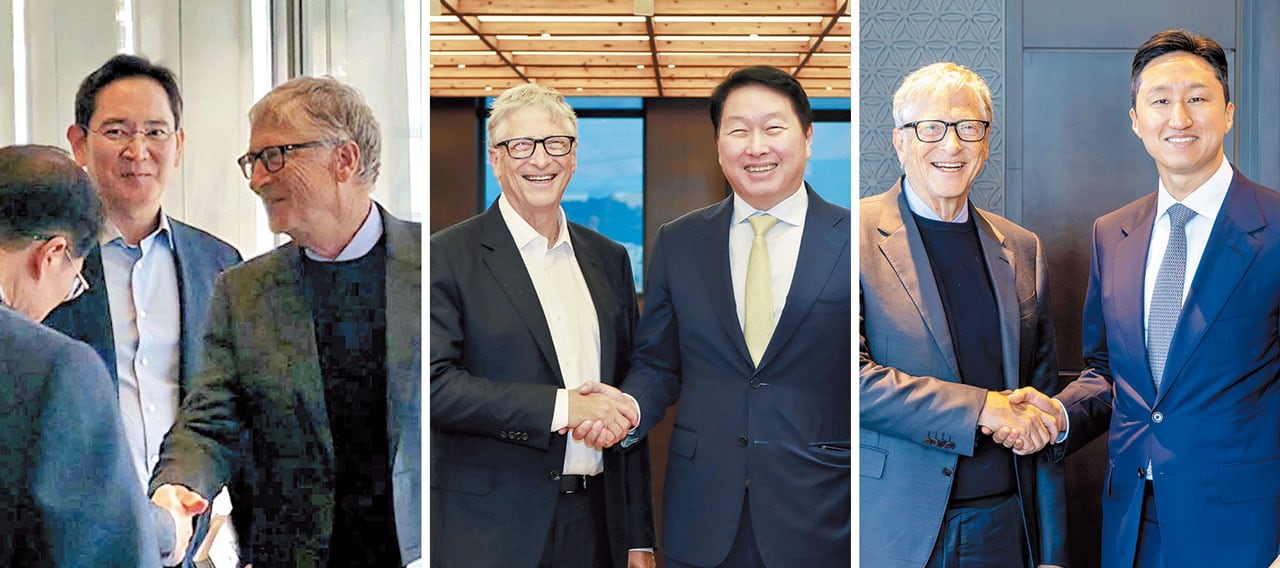Bill Gates Meets Korean Tech Giants to Explore Collaboration

Key Meetings and Discussions
Bill Gates, co-founder of Microsoft and chair of the Gates Foundation, recently visited South Korea for the first time in three years. During his stay from August 21 to 22, he engaged in several high-level meetings with leading business figures and government officials. These discussions focused on potential collaborations in small modular reactors (SMRs), biotechnology, and global social initiatives.
Collaboration with Major South Korean Corporations
Gates met with Samsung’s Lee Jae-yong, SK Group’s Chey Tae-won, and HD Hyundai’s Chung Ki-sun. The talks centered on advancing cooperation in SMRs, a promising technology that could revolutionize energy production. Additionally, discussions included biotechnology and global social projects, reflecting Gates’ broader interest in sustainable development and innovation.
On August 22, Gates met with Industry Minister Kim Jung-kwan and SK Group officials, along with executives from TerraPower, his SMR company. SK Group, as TerraPower’s second-largest shareholder with a $250 million investment, aims to commercialize SMRs globally by 2030. TerraPower has already started construction on the world’s first commercial SMR plant in Wyoming. Gates emphasized the importance of the Korean government's role in regulation and supply chain development for the rapid deployment of next-generation SMRs.
Government and Industry Collaboration
Minister Kim attended the meeting at TerraPower’s request, highlighting the significance of U.S.-Korea cooperation in developing a local SMR ecosystem. This was the first official meeting between the South Korean industry minister and Gates. Ahn Sei-jin, director of the Ministry’s Nuclear Power Policy Bureau, was also present. SK executives stressed the need to take an early lead in the global SMR market, which is projected to reach hundreds of trillions of won by 2040. They urged the government to offer incentives for private-sector participation and to strengthen international partnerships.
Expanding SMR Supply Chain
Gates also met with HD Hyundai Executive Vice Chairman Chung Ki-sun to discuss expanding the SMR supply chain and advancing commercialization. HD Hyundai, another investor in TerraPower, is preparing to supply key components such as reactor vessels and is collaborating on technologies for SMR-powered ships. Chung highlighted the strategic importance of the partnership, stating it would serve as a “catalyst for building a global nuclear supply chain and accelerating the transition to sustainable energy.”
Samsung and CSR Initiatives
In a separate meeting, Gates joined Samsung Electronics Chairman Lee Jae-yong and top executives for a luncheon at the company’s Seocho headquarters. The two discussed future cooperation on global corporate social responsibility (CSR) projects. Samsung and the Gates Foundation previously collaborated on a “reinvented toilet” initiative, with Samsung developing 100% wastewater recycling technology later deployed in public health projects in developing countries. Gates and Lee, who were both present at last month’s Allen & Co. conference in Sun Valley, Idaho, are known to maintain close ties.
Vaccine Development and Global Health
Gates also attended a dinner at SK’s headquarters in central Seoul on August 21 with Chey Tae-won, SK Bioscience CEO Ahn Jae-yong, and SK Biopharmaceuticals’ Chey Yoon-chung. Discussions centered on expanding cooperation in both SMRs and vaccines. SK chief Chey said, “Korea and SK can play a vital role in TerraPower’s SMR commercialization. By highlighting SMR’s safety, efficiency, and eco-friendliness, we can build greater market acceptance together.”
SK and the Gates Foundation have worked together for more than a decade to expand global vaccine access. The foundation has provided R&D funding while SK developed vaccines supplied to developing nations at low cost. Their joint efforts since 2013 have covered typhoid, pediatric enteritis, and COVID-19 vaccines. Both sides agreed to explore further collaboration on new vaccine development and broader global health initiatives.

Comments
Post a Comment